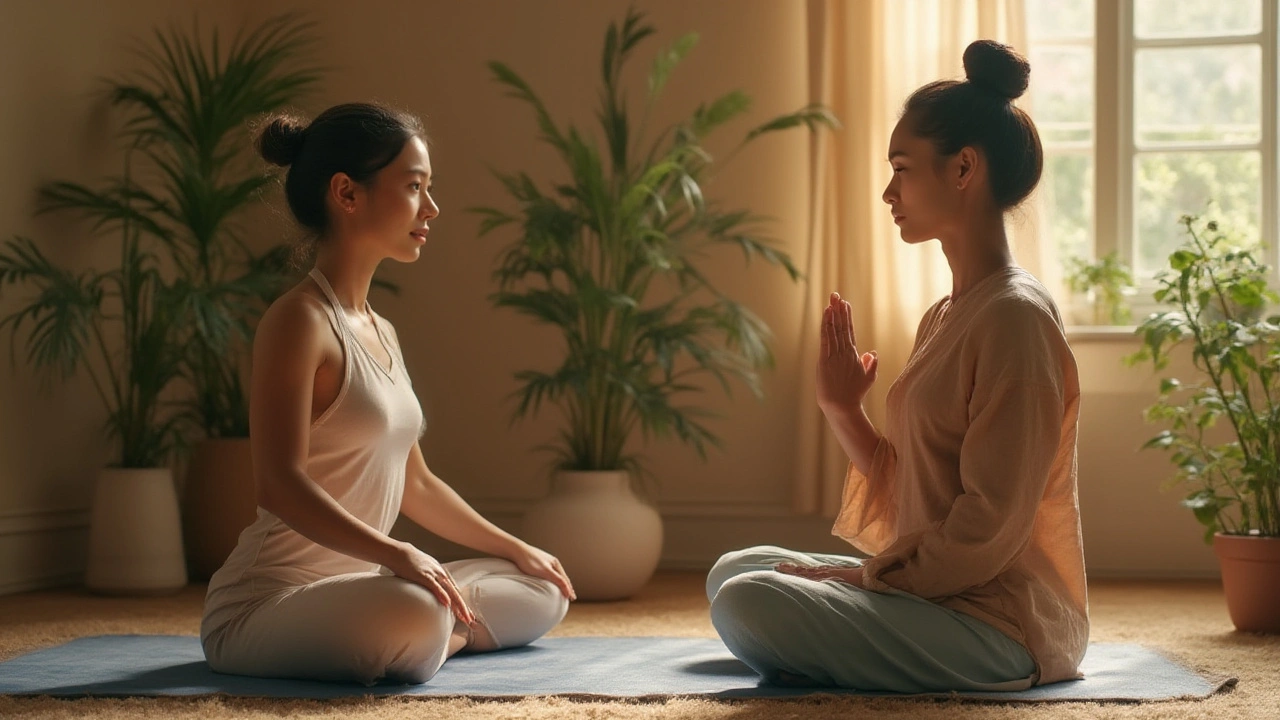Explore which essential oils are used in Thai massage, how they work, and the unique benefits they deliver for relaxation, pain relief, and wellbeing.

- Created by: Archer Caldwell
- Completed on: 22 May 2025
- Categories: Thai Massage
Pregnancy changes everything — sore backs, swollen feet, trouble sleeping. Sound familiar? If you’ve heard about Thai massage and wondered if it’s safe or even makes sense when you’re expecting, you’re not alone. This isn’t just a regular back rub; Thai massage has some unique moves that set it apart, especially for moms-to-be.
But here’s the real question: Can you actually get a Thai massage when you’re pregnant, or is that a no-go? There’s a lot of conflicting info out there, and honestly, it can get confusing fast. Let’s break it down into real, practical advice so you know what to expect and what to avoid. You deserve relief, but it’s got to be safe for you and the baby. Ready to get answers?
- Key Facts for Pregnant Moms
- Is Thai Massage Safe During Pregnancy?
- How Thai Massage Helps Expecting Mothers
- What Happens at a Pregnancy Thai Massage Session
- Making Your Thai Massage Safe and Relaxing
Key Facts for Pregnant Moms
If you’re thinking about getting a thai massage while pregnant, a few things should be clear before you book a session. Not every massage is safe, and pregnancy changes how your body reacts to pressure, stretches, and certain positions.
- Thai massage is generally not recommended during your first trimester. Those first 12 weeks are delicate, and most therapists will say no during this time.
- Only therapists with special training in prenatal massage should treat pregnant women—ask for credentials or look for clinics advertising prenatal experience.
- The usual twisting and deep stretching in traditional Thai massage don’t work for expecting moms. Therapists adapt the session by avoiding belly pressure and using much gentler techniques.
- You’ll likely be placed on your side with pillows for support, rather than lying on your stomach or flat on your back for long periods.
- Certain pressure points—especially around the ankles and wrists—are sometimes avoided, since they might trigger contractions.
Here’s a quick look at what’s most important at a glance:
| Fact | What It Means |
|---|---|
| First trimester caution | Skip Thai massage during weeks 1–12 |
| Only trained therapists | Ask for prenatal credentials |
| Gentle techniques only | No deep pressure or stretches |
| Modified positions | Mostly side-lying and plenty of pillows |
| Pressure point awareness | Certain spots are avoided for safety |
If you have a high-risk pregnancy or a medical condition like preeclampsia, always check with your doctor before booking any kind of massage, even with an experienced therapist. Let your massage therapist know how far along you are—they’ll adjust the session to match your needs. Good communication saves you from the awkward guesswork.
Is Thai Massage Safe During Pregnancy?
This is the burning question most moms-to-be want answered, and it makes total sense. Not every kind of Thai massage suits pregnancy because traditional techniques can be a bit intense—think stretching, lots of pressure, and moves that aren’t always bump-friendly. But that doesn’t mean you have to miss out completely.
The short answer: Thai massage can be safe during pregnancy—if it’s adapted to become a prenatal or pregnancy massage. That means lighter pressure, skipping any deep twisting, and careful handling of pressure points (especially those that could trigger contractions). Therapists trained in prenatal Thai massage know what to avoid: they skip your belly, avoid strong stretching, and never have you lying flat on your back for too long.
If you’re in your first trimester, most experts play it safe and recommend waiting until the second trimester (week 13 onwards) before getting any kind of Thai massage. It’s always smart to check with your OB-GYN or midwife before booking a session, especially if you have any pregnancy complications—think early contractions, high blood pressure, or a high-risk diagnosis.
- Always make sure your massage therapist is certified in prenatal massage—not just regular Thai massage. Ask them about their experience with pregnant clients.
- Let your therapist know about your pregnancy stage, aches, or specific health needs right away.
- If you feel dizzy, uncomfortable, or overheated during a session, speak up immediately. Your comfort and safety come first.
To make things even safer, most places use a side-lying position with lots of pillows to support your body. No traditional “walking on your back” here. The goal is to help relieve tension, not to push your limits. When it’s done by someone trained for prenatal care, Thai massage can be both relaxing and safe for you and the baby.

How Thai Massage Helps Expecting Mothers
Dealing with backaches, stiff neck, and heavy legs is basically a rite of passage during pregnancy. But here’s where thai massage really makes a difference: it focuses on gentle stretching and deep—but safe—pressure to relieve those classic pregnancy aches. Unlike deep tissue styles, this one avoids hard pressure on risky spots and keeps things extra careful around the lower back and belly.
There’s solid evidence that massage during pregnancy can cut down on swollen ankles and improve blood flow, which helps with all that puffiness. In fact, a study by the Touch Research Institute at the University of Miami found that women who got prenatal massage every week had lower levels of the stress hormone cortisol and even slept better. That’s gold when you’re waking up every hour to pee.
- Relieves muscle tension—especially in the hips, lower back, and shoulders, where most moms feel the strain.
- Improves mood by boosting feel-good hormones like serotonin. Getting regular massages is linked to fewer mood swings and less anxiety.
- Supports circulation, which helps cut down on swelling and that heavy-leg feeling.
- Helps with sleep: the gentle movements send calming signals to your nervous system, making it easier to fall (and stay) asleep.
- Teaches you to breathe and relax, which honestly comes in handy for labor later on.
Just keep in mind: expecting moms should always get the green light from their doctor before booking any massage. And don’t be shy about asking if your therapist has experience working with pregnant women. The best places either have certified prenatal therapists or they’ll swap in specific techniques to keep both you and baby safe.
| Benefit | How Thai Massage Helps |
|---|---|
| Reduced Swelling | Improved lymphatic and blood circulation |
| Less Back Pain | Stretches and eases tight lower back muscles |
| Better Sleep | Encourages relaxation and lower stress hormones |
| Improved Mood | Stimulates serotonin and reduces anxiety |
A lot of moms-to-be say they leave the session feeling lighter—sometimes for the first time in weeks. When you add up all these perks, it’s pretty clear why Thai massage is catching on as a safe way to feel better during pregnancy.
What Happens at a Pregnancy Thai Massage Session
Your first pregnancy Thai massage feels different from a typical spa visit. After you check in, the therapist will talk to you about how far along you are, any aches or concerns you have, and which spots are off-limits. This chat is important. Some pressure points—like around the ankles and wrists—are usually avoided because they might trigger contractions.
You’ll likely wear comfy, loose clothes rather than stripping down. Typical Thai massage happens on a floor mat, but many places have special tables or elevated beds to help expecting moms get up and down safely. Lying flat on your back or stomach isn’t recommended after the first trimester, so you’ll spend most of the session on your side, cushioned by soft pillows for full support.
Instead of deep stretches and strong compressions, pregnancy Thai massage uses gentle techniques. Think light pressure, slow movements, and lots of focus on the lower back, shoulders, and legs—spots that usually take the biggest hit during pregnancy. Therapists may use their palms and thumbs for a softer touch instead of elbows or knees, so the whole thing feels soothing, not jarring.
Don’t expect oil slathering—that’s more of a Swedish thing. Thai massage mostly works without oils, though sometimes a tiny bit gets used on feet or hands for comfort. Most sessions run 60 to 90 minutes, but you can always ask for shorter if you’re not used to massage or just want to try it out.
- Open communication matters: Always let your therapist know if something hurts or feels off during your massage. Never push through discomfort.
- Pillows are your new best friends: If you need more, just ask. Proper support is key, especially if you get stiff easily.
- Hydration helps: Drink water afterward. Massage can get your circulation flowing, and being hydrated helps flush out any released tension.
The whole goal is making you feel comfortable and supported, not twisted or stretched out. When you finish, you should feel lighter, less tense, and—this one’s important—completely safe. A good thai massage therapist trained in prenatal care will always put you and your baby’s wellbeing first.

Making Your Thai Massage Safe and Relaxing
Your comfort and safety are the top priorities when it comes to Thai massage during pregnancy. There’s a lot you can do to make sure things go smoothly and avoid any unnecessary risks.
First off, always check that your massage therapist is specifically trained in prenatal Thai massage. This isn’t just about technique—it’s about understanding the changes your body is going through. The best therapists will ask about how far along you are and adjust every move to match your needs.
- If you’re in your first trimester, talk to your doctor before booking a session. Most therapists will recommend waiting until your second trimester because the risk of miscarriage is highest early on.
- Avoid deep pressure, twists, or any stretches that feel intense. Let your therapist know if something doesn’t feel right, even if you think you’re just being picky. This is about your body, your safety, and your baby’s well-being.
- Thai massages for pregnant women usually happen on a padded floor mat, but therapists should offer plenty of pillows for your comfort, especially for the hips and knees.
- Stay hydrated — have a glass of water before and after your session. It helps flush out any toxins released by the massage.
Here are some red flags where you should skip the massage and check in with your doctor first:
- You have a high-risk pregnancy or complications such as preeclampsia, placenta previa, or severe swelling.
- You’re experiencing pain, spotting, or contractions.
- You have a fever, rash, or feel unwell in any way.
Surprisingly, according to the American Pregnancy Association, up to 60% of pregnant women get at least one massage during their pregnancy, and most report a reduction in back pain and better sleep after each session.
Here’s a quick look at the do’s and don’ts before you book your thai massage:
| Do | Don’t |
|---|---|
| Pick a therapist trained in prenatal massage | Choose a masseuse who isn’t comfortable with pregnancy clients |
| Tell your therapist about any aches, pains, or concerns | Stay silent if you’re uncomfortable during the session |
| Ask about sanitized mats, blankets, and pillows | Accept dirty or shared linens |
| Eat something light an hour or two before your session | Go on an empty stomach or right after a big meal |
| Listen to your body and take breaks if needed | Push through discomfort just to finish the massage |
Don’t be shy about asking lots of questions before your appointment. Even experienced moms learn something new every pregnancy, and there’s no such thing as being too careful. A safe, comfortable Thai massage can feel like a lifesaver during pregnancy if done right, so set yourself up for a relaxing and stress-free experience.
Curious about Thai massage during pregnancy? This article walks you through the essentials – from what sets it apart to how it actually feels when you’re on the table. Find out if it’s really safe, what benefits it has for moms-to-be, and how to spot a qualified therapist. Get straight answers on costs, booking, and safety tips, so you can relax and enjoy your prenatal experience with confidence.
Curious what happens during your first Thai massage in London? Discover hands-on tips, the real deal on techniques, and how it feels—straight from experience.


